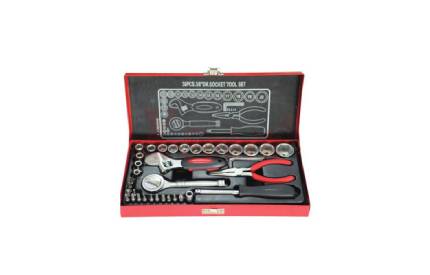Special tools refer to measuring tools, cutting tools, abrasives, hardware tools, diamonds and their products, cemented carbide blades, etc. used in mechanical processing. The goal of management is to meet the needs of scientific research and production, ensure product quality, increase production efficiency, and reduce product costs. Adjustable stainless steel wrench supplier introduces you to the four management principles of special tools.
1. Incentive competition mechanism and "people-oriented" technology and economic management methods should be introduced.
2. It should be conducive to the use of new processes, new technologies, new materials, promote the advancement of tool technology, and make good preparations for integration.
3. It should ensure the smooth progress of production and use value engineering principles to choose tools reasonably according to needs, reduce tool inventory and consumption as much as possible, accelerate cash flow turnover, and improve economic efficiency.
4. Should meet the needs of tool replacement, market competition is fierce, in order to improve the competitiveness of enterprises and products, give full play to the use efficiency of tools and extend their service life.
The copper alloy explosion-proof toolbox is made of high-purity electrolytic copper and precious rare metals, and the surface of the aluminium bronze explosion-proof toolbox is silver-yellow. The hardness of the working surface is above HRC25, and the tensile strength is δb75-85kgf / mm². When working in an ethylene environment with flammable gas, impact, friction, and falling weight cannot produce spark explosion. The explosion-proof grade of the explosion-proof toolbox is in accordance with GBE * IIB standards. After the explosion-proof tool made of beryllium bronze is made into a tool, its surface appears gold-coloured. The surface hardness is above HRC35, and the cara strength is δb105-120kgf / mm². When working in the easily combustible gas hydrogen, its impact, friction, falling weight, etc. cannot produce spark explosion.
The various explosion-proof tools in the explosion-proof toolbox should have oil stains on the surface before use. After use, the oil stains and impurities on the surface should be wiped clean. It should be stored in a dry place and isolated from corrosive substances. If it is not used for a long time, an appropriate amount of lubricant should be applied for storage.

Explosion Proof Tools
The explosion-proof toolbox cannot be used with excessive force, long-arms tied with other metal materials or hammered. Avoid breaking or deformation caused by overload, which will affect the normal use. In use, the varieties and specifications should be reasonably selected according to the needs. It is not allowed to be small and large, or to use explosion-proof toolboxes as steel tools.
The sparks that cause detonation are not generated by explosion proof tools themselves, but by work objects. The use of explosion-proof tools cannot prevent such explosions, and other explosion-proof methods are used. Issues that should be noted in the application of non-sparking tools:
1. When the tool collides with the rock, there is a possibility of sparks. In this case, the generation of sparks has nothing to do with the metal. When the rock body breaks under the expansion force, the mechanical energy of the impact becomes electrical energy. This electrical energy is released in the form of electric sparks. Sparks are particularly easy to produce in rocks containing quartz, silicon oxide and sandstone. In general, the higher the quartz content or the larger the particles in the rock, the easier it is to ignite. In order to prevent the occurrence of explosion accidents, rocks can be penetrated into the water to explode.
2. When an explosion-proof tool strikes or rubs a copper-iron thermal workpiece coated with aluminium paint, there is a possibility that sparks that can ignite explosive substances may be generated. If the powder particles of aluminium, magnesium and its alloy adhere slightly on the surface of rusty steel. A hard exothermic aluminothermic reaction may occur when hit by a hard substance or even hard rubber or plastic, which is likely to detonate.
评论
发表评论